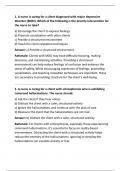Exam (elaborations)
ATI Capstone Mental Health Final Assessment 2025: Actual Exam with 50 Questions and Correct Detailed Answers, Including Rationales (successus)
- Course
- Institution
ATI Capstone Mental Health Final Assessment 2025: Actual Exam with 50 Questions and Correct Detailed Answers, Including Rationales (successus)
[Show more]



